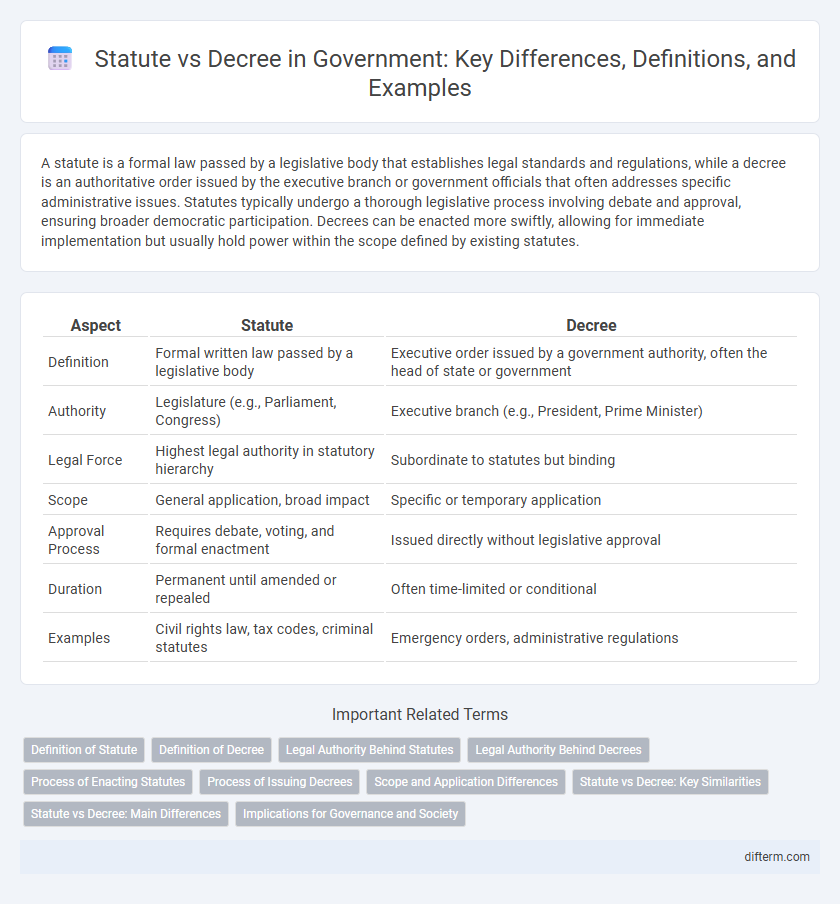A statute is a formal law passed by a legislative body that establishes legal standards and regulations, while a decree is an authoritative order issued by the executive branch or government officials that often addresses specific administrative issues. Statutes typically undergo a thorough legislative process involving debate and approval, ensuring broader democratic participation. Decrees can be enacted more swiftly, allowing for immediate implementation but usually hold power within the scope defined by existing statutes.
Table of Comparison
| Aspect | Statute | Decree |
|---|---|---|
| Definition | Formal written law passed by a legislative body | Executive order issued by a government authority, often the head of state or government |
| Authority | Legislature (e.g., Parliament, Congress) | Executive branch (e.g., President, Prime Minister) |
| Legal Force | Highest legal authority in statutory hierarchy | Subordinate to statutes but binding |
| Scope | General application, broad impact | Specific or temporary application |
| Approval Process | Requires debate, voting, and formal enactment | Issued directly without legislative approval |
| Duration | Permanent until amended or repealed | Often time-limited or conditional |
| Examples | Civil rights law, tax codes, criminal statutes | Emergency orders, administrative regulations |
Definition of Statute
A statute is a formal written law enacted by a legislative body, such as a parliament or congress, to regulate conduct within a jurisdiction. Statutes possess general applicability and are binding on all individuals and entities within the government's authority. Unlike decrees, which are often issued by executive authorities for immediate or specific purposes, statutes undergo a legislative process involving debate, amendment, and approval.
Definition of Decree
A decree is an official order issued by a government authority, typically the executive branch, that has the force of law without requiring legislative approval. It serves as a direct instrument to implement policies, regulations, or administrative decisions rapidly. Unlike statutes, decrees are often temporary and can be subject to judicial review or legislative override.
Legal Authority Behind Statutes
Statutes derive their legal authority from legislative bodies such as parliaments or congresses, establishing them as formal laws passed through a structured legislative process. Decrees, by contrast, are issued by executive authorities like presidents or ministers and carry legal force based on delegated powers granted by existing statutes or constitutions. Understanding the distinction is crucial for interpreting the hierarchy and validity of legal norms within government frameworks.
Legal Authority Behind Decrees
Statutes originate from legislative bodies and carry the highest legal authority, establishing broad frameworks and rules. Decrees are issued by executive authorities, such as presidents or ministers, to implement or enforce statutes under delegated powers. The legal authority behind decrees depends on statutory authorization, enabling the executive branch to address administrative details and urgent matters within the boundaries of legislative intent.
Process of Enacting Statutes
The process of enacting statutes involves multiple stages, including drafting, committee review, debates, and voting within the legislative body, ensuring thorough examination and public participation. Statutes undergo formal approval by the legislative branch and often require executive assent before becoming law. This rigorous legislative procedure contrasts with decrees, which are typically issued unilaterally by executive authorities without extensive legislative deliberation.
Process of Issuing Decrees
Decrees are issued by the executive branch and typically follow a streamlined process compared to statutes, which require legislative approval. The issuance of a decree involves drafting by relevant ministries or agencies, followed by review and final approval from the head of government or state. Unlike statutes, decrees can take effect immediately but must comply with existing laws and constitutional provisions.
Scope and Application Differences
Statutes are laws enacted by legislative bodies with broad scope, establishing general principles applicable to all individuals within a jurisdiction. Decrees are authoritative orders issued by executive authorities or government officials, often with limited or specific application targeting particular situations or administrative matters. The scope of statutes typically encompasses long-term legal frameworks, while decrees address immediate or specialized regulatory enforcement.
Statute vs Decree: Key Similarities
Statutes and decrees both serve as formal legal instruments used by government authorities to establish rules and regulations with binding force. Each originates from a legitimate source of power: statutes typically arise from legislatures, while decrees are issued by executive authorities or heads of state. Both mechanisms aim to implement and enforce policy decisions within the legal framework of a jurisdiction.
Statute vs Decree: Main Differences
A statute is a law enacted by a legislative body, reflecting a formal, deliberate process involving debate and approval by elected representatives, whereas a decree is an authoritative order issued by the executive branch or a government official, often bypassing legislative procedures. Statutes typically have broader applicability and are enduring legal norms, while decrees are more specific, urgent measures designed for immediate implementation and can be subject to legislative review or repeal. The distinction lies in the source of authority, the legislative involvement, and the scope and permanence of the legal instrument.
Implications for Governance and Society
Statutes, enacted by legislative bodies, provide clear, democratic legitimacy and long-term stability in governance, establishing comprehensive legal frameworks that guide societal behavior. Decrees, often issued by executives or administrative authorities, allow for swift, flexible decision-making, but may concentrate power and reduce transparency, potentially impacting civil liberties and checks and balances. The balance between statutes and decrees influences government accountability, legal predictability, and the protection of citizens' rights within a functioning democratic system.
statute vs decree Infographic

 difterm.com
difterm.com